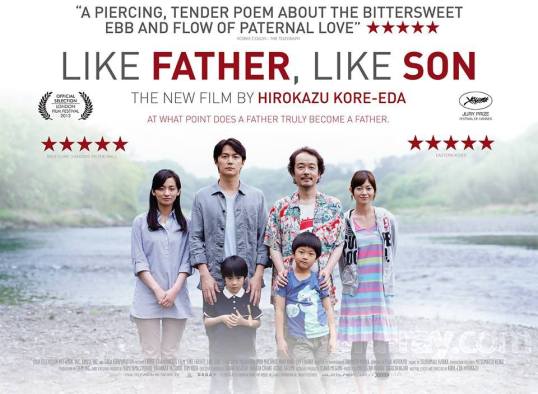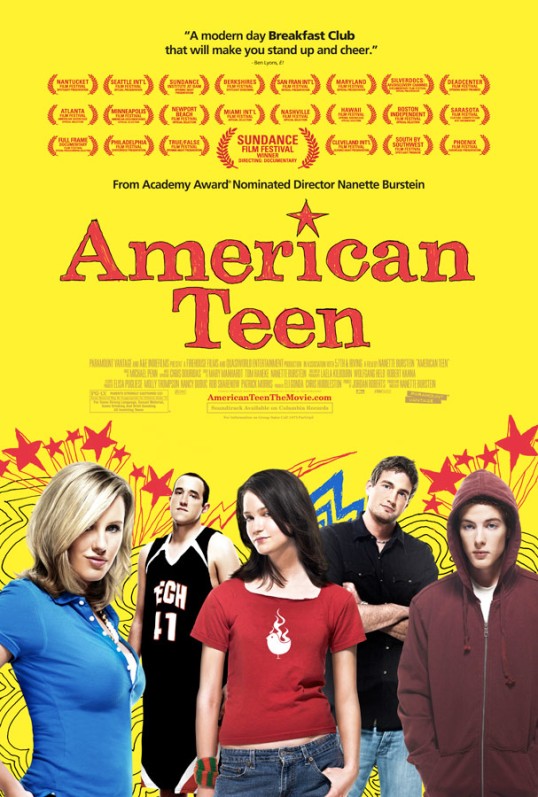Would you choose your natural son, or the son you believed was yours after spending 6 years together? Kore-eda Hirokazu, the globally acclaimed director of “Nobody Knows”, “Still Walking” and “I Wish”, returns to the big screen with another family – a family thrown into torment after a phone call from the hospital where the son was born… Ryota has earned everything he has by his hard work, and believes nothing can stop him from pursuing his perfect life as a winner. Then one day, he and his wife, Midori, get an unexpected phone call from the hospital. Their 6-year-old son, Keita, is not ‘their’ son – the hospital gave them the wrong baby. Ryota is forced to make a life-changing decision, to choose between ‘nature’ and ‘nurture.’ Seeing Midori’s devotion to Keita even after learning his origin, and communicating with the rough yet caring family that has raised his natural son for the last six years, Ryota also starts to question himself: has he really been a ‘father’ all these years…. Written by Wild Bunch (Imdb)
theguardian.com, Saturday 18 May 2013
Hirokazu Kore-eda has returned to Cannes with another gentle and warm-hearted family drama in that classic Japanese manner that he has been gravitating towards in recent movies like Still Walking (2008) and I Wish (2011). It is a very decent piece of work, although not as distinctive as those two previous movies, not quite as finely observed and frankly a little schematic and formulaic, with life-lessons being learnt by the obvious people. It does however have charm and abundant human sympathy.
Like Father, Like Son is a “baby-swap” drama: go-getting salaryman Ryota (Masaharu Fukuyama) and his sleek wife Midori (Machiko Ono) live in a perfect modern house and have a little 6-year-old boy — their only child — whom they push hard educationally. Then the hospital sends the devastating news that their baby was mixed up six years ago with the child now being raised by another family, with other siblings: Yudai (Franky Lily), an amiable semi-slob who works behind the counter of a shop and his sensible wife Yukari (Yoko Maki). The slow, agonising diplomatic process of meetings between the families begins, and Ryota hires a hotshot lawyer, ostensibly so that all four can unite to sue the hospital. But arrogant Ryota has an awful secret plan: snobbishly aghast at where his biological boy is being raised, and unwilling to relinquish the one he has naturally come to love, he is scheming somehow to prove legally that Yudai and Yukari are unfit parents so that he can take legal charge of both boys — or to make them a huge cash offer to let their son go to him.
Kore-eda has said that he was inspired by his own recent experience of fatherhood to write and direct this film and by the “baby-swap” cases inJapan in the 1960s. I wonder if he was not also inspired by Salman Rushdie’s Midnight’s Children, whose basic plot resembles this movie in a couple of key particulars. Nature versus nurture is the obvious theme, and this movie suggests that nature is far less important than we might think.
There is a doppelgänger theme, interestingly like that of his earlier film I Wish, in which two brothers were being raised in different households: with the amiable slacker dad and hardworking worrier mum. But there was complexity in that story, and no reassurance as to which parent has got it right about life and which of them is wrong. In this film it is quite plain: Ryota should loosen up, and easy-going, goofy Yudai is the life-affirming good guy. The movie tracks Ryota’s crisis, and assumes that Yudai doesn’t and needn’t change. There is something more challenging in its depiction of Midori, who feels guilty that her boy is an only child with no sibling-playmates, and wonders if allowing the other family to take him is the right thing to do. But then what right has she to inflict only-child loneliness on the boy they’re getting in return?
The story of the two boys has an interesting larger resonance. Perhaps many hard-working strivers in Japan — people who have worked tremendously hard from their infancy to get to the top in business, or indeed film-directing —might sometimes look wonderingly into the mirror and consider if they might be happier in an alternative, underachieving existence. Who knows? This is a sweet-natured, but essentially undemanding film from Kore-eda.
http://www.theguardian.com/film/2013/may/18/cannes-2013-like-father-like-son-review
The Observer, Sunday 20 October 2013
Hirokazu Kore-eda’s previous feature, I Wish, was a jewel of a film; a tale of two young brothers torn apart by their parents’ separation who put their faith in a mythical vortex created by the passing of speeding bullet trains. The original title of that film was Kiseki – the Japanese word for miracle – which perfectly captured its transcendent, humanist charm.
Kore-eda returns to the subject of parents and children in this beautiful, melancholic paean to paternity, which sifts through issues of nature and nurture as gently as a hand passing through drifting sand. The story is an old one – two babies, accidentally swapped at birth, raised by families of differing social status, now faced with the heartbreaking prospect of having to exchange their six-year-olds in whom each family has invested so much energy, ambition and love. Masaharu Fukuyama is the affluent workaholic whose initial sideswiped reaction (“Now it makes sense …”) masks more complex inner turmoil; his aversion to the ramshackle family in which his biological son has been raised inevitably gives way to a realisation that he has been an absent father and husband – repeating the patterns of previous generations.
While the adults attempt to sort through the conflicting bonds of blood and water, the children flow from family to family like intermingling streams of effervescent life. As before, Kore-eda’s facility for casting and directing young performers is spine-tingling; watching these children as they watch their parents is utterly mesmerising, reminiscent of the finest work of the Dardenne brothers; unobtrusive, intuitive, instinctive. Equally impressive is the refusal to reduce any of the adults to stereotypes – while a cliched contrast between wealth and austerity beckons, Kore-eda invests his characters with believable flaws and strengths, regardless of class and situation. Even the nominal “villain” of the piece (the nurse responsible for the switch) is given a sympathetic hearing – a lost soul with her own parental issues. The result is a deceptively rich and rewarding drama, small of gesture, huge of heart.
http://www.theguardian.com/film/2013/oct/20/like-father-like-son-review
One of the great themes of Japanese cinema, and perhaps the greatest, is family: particularly our place within it, and its within us. More than 80 years have passed since Yasujiro Ozu first set his camera on a tripod, lowered its legs slightly and made I Was Born, But…, and you might well assume that by now the subject would be pretty well exhausted. But Hirokazu Kore-eda has found a fresh perspective on this durable theme, and he surges into it like a child playing inside a duvet cover, feeling his way right to the corners.
And playfulness is the prevailing spirit of the piece: despite the film’s unhappy premise, watching Like Father, Like Son feels like paddling in a clear, sunlit spring. Kore-eda’s film is about two families who discover that their six-year-old boys were switched at birth, and it centres on one of the fathers; a busy architect called Ryota Nonomiya (Masaharu Fukushima) who lives with his wife Midori (Machika Ono) and their polite and neatly brushed six-year-old son Keita. Their home is a well-appointed Tokyo apartment that has had the life interior-designed out of it, and Ryota works long hours to pay for it.
When Keita registers for primary school, a blood test reveals that he is not in fact the Nonomiyas’ child, and further inquiry reveals that their biological son has been living across town with a Mr and Mrs Saiki, who own a not-all-that-busy electrician’s shop. His name is Ryusei, and the hospital suggests that the two families get to know one another and, over a period of 12 months, exchange one boy for the other.
When Kore-eda’s film screened in Cannes, it prompted the loudest reactions yet from the habitually noisy crowd: rippling laughter throughout, sustained applause at the close, and a steady refrain of goosey honks as attendees cleared their tear-streaming noses.
http://www.telegraph.co.uk/culture/film/filmreviews/10066000/Like-Father-Like-Son-review.html


